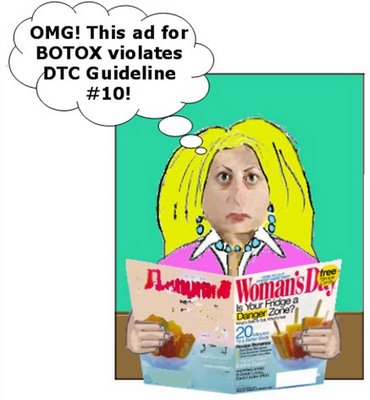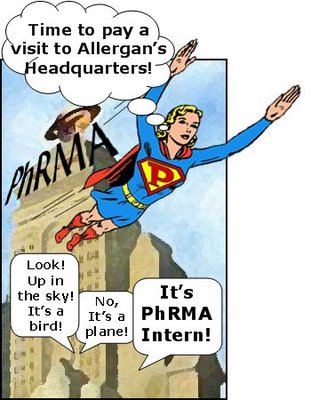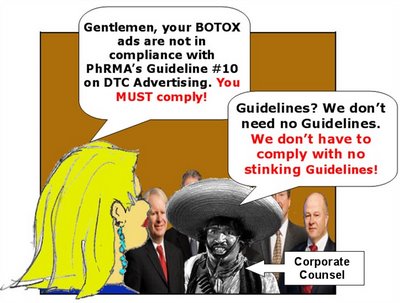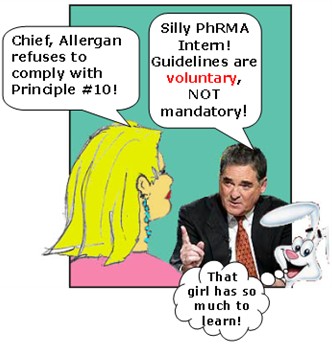PhRMA Intern vs. Botox Redux
Pharmalot recently reported that Public Citizen Demands A Black Box For Botox.
A Public Citizen analysis of FDA data found that between Nov. 1, 1997, and Dec. 31, 2006, there were 658 reported cases of people suffering adverse effects from injections of botulinum toxin. Of these, 180 were associated with aspiration (fluid in the lungs), dysphagia and/or pneumonia; 87 required hospitalization. There were 16 deaths, including four in children younger than 18 years old.Botox DTC ads have bothered me for a long time because they are "reminder ads" that do NOT have to mention such side effects. Here's a post I made to Pharma Marketing Blog over a year ago!

On her lunch break, while innocently reading the latest issue of Woman's Day magazine, Emily Jameson, mild-mannered summer intern at PhRMA -- America's pharmaceutical trade association -- is startled by an ad she sees...

Emily believes that Principle #10 of PhRMA's Guiding Principles for Direct To Consumer Advertising for Prescription Medicines calls for the elimination of so-called "Reminder Ads," which are usually 30-second TV commercials that mention a drug's name without stating the health conditions for which the medicine is approved and without listing the major risks associated with the drug. These ads are perfectly legal from a regulatory point of view.
You might have seen reminder ads on TV for Lunesta (see, for example, "Sepracor Sneaks In Lunesta Reminder Ad").Here's the BOTOX ad Emily saw in Woman's Day magazine:

According to the BOTOX Web site, BOTOX Cosmetic is indicated for the "temporary improvement in the appearance of moderate to severe glabellar lines [ie, wrinkles between the brows] associated with corrugator and/or procerus muscle activity in adult patients." Neither lady in the ad exhibits any hint of glabellar lines, which I suppose is the point -- they've already been "hit up" with their BOTOX injections and are enjoying their brief "time" between injections!
But you already know what BOTOX is for! Very few people have escaped the PR and buzz about BOTOX, which has become part of the culture of many countries (in some countries, however, people are much less concerned about wrinkles between the brows). Again, this is the power of public relations as a marketing tool (see, "Marketing Disguised as PR", for more on this).
Viagra is another drug that has benefited greatly by PR and buzz. However, you won't see any Viagra reminder ads -- at least not in the US. Here are some examples of what are purported to be Viagra reminder ads in other countries.Once again (see the first installment of "The Adventures of PhRMA Intern"), Emily is quick to respond:
 Ducking into PhRMA's Office of Responsibility, mild-mannered Emily Jameson -- lowly summer intern -- transforms into PhRMA Intern!
Ducking into PhRMA's Office of Responsibility, mild-mannered Emily Jameson -- lowly summer intern -- transforms into PhRMA Intern! 
BOTOX is produced and marketed by Allergan, a biotechnology company that likes to call itself a pharmaceutical company. BOTOX Cosmetic accounts for perhaps 40% of Allergan's total sales.
Just a few minutes after leaping from the small window in the Office of Accountability, PhRMA Intern lands at Allergan headquarters in Irvine, California and confronts Allergan's Executive Committee (and Corporate Counsel)...

PhRMA Intern offers the BOTOX print ad that she ripped out of Woman's Day magazine as proof of non-compliance. She doesn't mention all the similar BOTOX TV ads she has seen. Since PhRMA Intern didn't mention the TV ads, and because PhRMA's DTC Guideline #10 only applies to TV ads and NOT to print or Internet ads, Allergan's Corporate Counsel can truthfully claim that Allergan needs "no stinking guidelines."
"Drats," exclaims PhRMA Intern, "foiled again by a wily corporate counsel!"
Back at PhRMA headquarters, PhRMA Intern -- now disguised as mild-mannered Emily Jameson -- learns the REAL reason why Allergan can run BOTOX reminder ads with impunity!
 Not only are PhRMA's Guiding Principles voluntary, they apply only to PhRMA's member companies and only to those who have agreed to comply with them. [If you are trying to search PhRMA's Web site for the signatories, don't bother. There is no such list available.]
Not only are PhRMA's Guiding Principles voluntary, they apply only to PhRMA's member companies and only to those who have agreed to comply with them. [If you are trying to search PhRMA's Web site for the signatories, don't bother. There is no such list available.] Allergan, like other biotech and specialty pharmaceutical companies, is a member of another trade association headed up by a former politico: BIO, the Biotechnology Industry Organization.
Considering that biotechnology companies like Allergan are beginning to market their products directly to consumers much like the rest of the pharmaceutical industry (see "Biotech DTC: Business Not As Usual"), it behooves BIO and its member companies to at least do what PhRMA has done: draw up a set of principles for DTC advertising that its members can use.
PhRMA Intern says: "Considering that many biotech drugs (eg, injectables) have very serious side effects -- BOTOX Cosmetic's side effects include 'serious heart problems and serious allergic reactions' -- BIO should certainly insist that its members NOT run reminder ads on TV, in print, or on the Internet!"

No comments:
Post a Comment